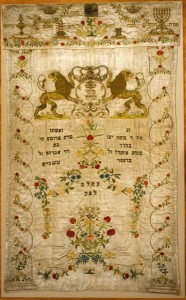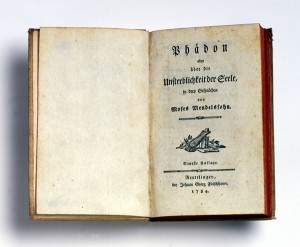On our “Open Day at the Academy,” this Sunday, 27 October 2013, we will celebrate the namesakes of the new public square in front of the Academy on Lindenstrasse: Fromet Mendelssohn, née Gugenheim, and her husband Moses Mendelssohn are now immortalized on Berlin’s cityscape, following much debate and deliberation. Reason enough to find out more about this exceptional couple!

Inspired by deep religious feeling, Fromet and Moses Mendelssohn had Fromet’s wedding dress converted into a Torah curtain. They presented it to Berlin’s Jewish community, where, in the synagogue, it decorated the shrine.
You can find this and other objects relating to Moses Mendelssohn held by the Jewish Museum Berlin in our collections …
In the spring of 1761, when philosopher Moses Mendelssohn met the merchant’s daughter Fromet Gugenheim during a visit to Hamburg, his fate was sealed: he declared his love for her in a garden pavilion, and “stole a few kisses from her lips.” He returned, besotted, to Berlin and wrote to his friend Gotthold Ephraim Lessing:
“I have committed the folly of falling in love in my thirtieth year. The woman I wish to marry has no assets, is neither beautiful nor erudite; yet I am a lovesick beau, so smitten that I believe I could live with her happily ever after.”
The two were wed in June 1762. That they married for love was highly unusual: most marriages at the time were arranged by matchmakers. “[O]ur correspondence can do without ceremony,” Moses assured Fromet on 15 May 1761, in the very first of his letters to his bride: “…our hearts will respond.”
“Before I met you, my love, solitude was my Garden of Eden. But it is intolerable to me now.” Berlin, 24 October 1761
For over a year, Moses Mendelssohn and Fromet Gugenheim sent each other two letters a week. Several of Moses Mendelssohn’s so-called “letters to his bride” and Fromet Mendelssohn’s “letters from a marriage” have survived, and are now held by the Music Department of the Staatsbibliothek in Berlin. They were written in Judeo-German, in Hebrew characters, which was common at the time. The letters touch upon themes such as Moses Mendelssohn’s criticism of traditional Jewish marriage contracts, and the legislation pertaining to Jews’ right to settle in Berlin – as a native of Dessau, Mendelssohn had to apply for a permit to marry his Hamburg-born bride in Berlin – as well as their future home in Berlin, the intellectual debates pursued by the lovestruck couple and their friends, and – in a delightful letter dated 2 October 1761 – the defense of the wig.
“You have a too noble mind to even begin to imagine what wealthy Berliners are like. If ever I am lucky enough to see you here before me and, God willing, to live with you, you will have to avoid associating with our wealthy neighbors, because your character will never tolerate their way of thinking.” Berlin, 7 July 1761

Moses Mendelssohn: “Phädon or On the Immortality of the Soul”
© Jewish Museum Berlin, photo: Jens Ziehe
Fromet and Moses Mendelssohn’s home in Berlin was known for its openness and lively intellectual exchange. The Berlin salons hosted in later years by Henriette Herz among others (a friend of Fromet’s daughter Brendel, later Dorothea Schlegel) were inspired on Fromet Mendelssohn’s company, as Thomas Lackmann suggests (and will explain in greater detail at his reading this Sunday).
Fromet gave birth to ten children, four of whom died in infancy. Following her husband’s death in 1786, she left Berlin with her three youngest children and settled in Strelitz. In 1800 she moved to her native city, Hamburg, where she died in 1812. Incidentally, four of Moses and Fromet’s children were baptized several years after their father’s death.
So, if you stroll across the Academy’s forecourt on Sunday, or on any other occasion, may its name inspire you to reflect on philosophy and love, and on two exceptional lovers.
Monika Flores Martínez, Permanent Exhibition, & Signe Rossbach, Event Curator
Sunday 27 October 2013, 11 am
Free entrance
Actor Oliver Elias and actress Jasmin Moné will read excerpts from Moses Mendelssohn’s “letters to his bride” and Fromet Mendelssohn’s “letters from a marriage,” and Thomas Lackmann will speak about the fate and fortunes of the illustrious couple.
On the occasion of our “Open Day at the Academy,” which runs from 11 am to 5 pm, we will present material from the museum’s archive and library, from the Academy’s Migration and Diversity programs, and will host several readings and workshops for children and teenagers.
PS: You can find a letter from Moses Mendelssohn to his bride Fromet Gugenheim (1760) in the timeline presentation of our permanent exhibition …
I would have apprecated it, if my biography of Fromet Mendelssohn (“Fromet Mendelssohn. A Life Beneath the Bonnet”, Budapest, Argumentum,2012),the first and only biography of Fromet to date, would have been mentioned.